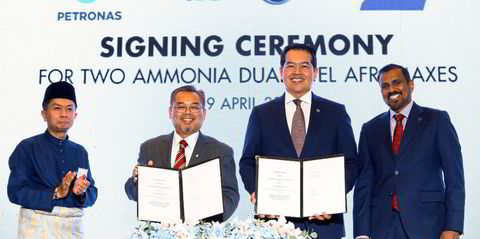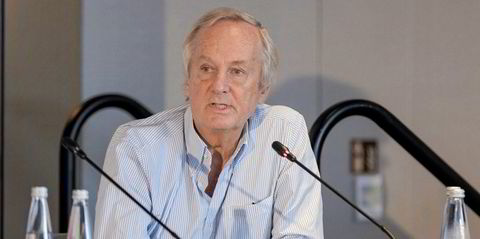BP Shipping chief executive Susan Dio is a new face to many in the maritime industry. She has been in the job for just over 10 months and although she has spent 32 years in the BP stable, this is her first brush with the shipping sector.
Immediately engaging, with a ready laugh and an infectious enthusiasm, she is clear and careful in her speech — a legacy, perhaps, of time spent within a corporate group like BP. However, she is also refreshingly energetic and not afraid to share something of her life and character.
Dio, 55, describes herself as “obviously American”, “probably quite outgoing” and “passionate”. As a newcomer to the shipping industry she is fortunate that those insiders whom TW+ contacted had either not met her yet or were too polite to reveal their first impressions.
But Dio has more connections with the maritime world than might at first be apparent. She and her two brothers were brought up in a military family home watching her father, a submarine captain, go off to sea.
Dio says her dad, now in his mid-80s, is “absolutely thrilled” at her latest career move but she suspects that he would not have predicted that of his three children it would be his daughter who took on this role.
The lure of the sea appears to be continuing for the family. One of her two sons, Travis, 28, works as a deck cadet on offshore supply vessels in the US Gulf — and so grandfather and grandson are trying to out-do each other with their sea stories.
Dio may have a few tales of her own to throw into the mix soon. She has already been on several BP vessels while they were in dry dock, including making the long trip down to the bottom of the cargo tank on a Gem-class LNG carrier.
The new chief executive would love to take a voyage on a vessel if the opportunity arises, adding: “I think it would probably terrify the crew.”
Indeed it might. Dio is unlikely to be a mute observer.
A chemical engineer by training, she clearly enjoys a chance to be more hands-on. “I love to put on my boiler suit and hard hat. That’s a big day for me,” she says. “I really like that — getting to peek at a few welds.”
Taking a lead from her older brother, who was working as a chemical engineer, Dio took the subject as her degree course at the University of Mississippi. “I wasn’t exactly sure what they did, but I was good at math and science, so I did that,” she explains.
After graduating, she went to work in the petrochemicals sector as a chemical engineer with Sohio group company Vistron. She spent 17 years in petrochemicals, working on projects, process engineering and — shipyards beware — qualifying as a welding inspector.

In 1987, BP bought the remaining shares in Sohio, and Dio switched seamlessly into the oil major’s camp, continuing to work on the downstream side of the business.
The millennium brought an 18-month spell at head office in London as an executive assistant and a chance for the family to sample life in the UK.
A move into the refining business followed. Dio was commercial manager at the Texas City Refinery when the facility suffered a massive explosion in 2005, killing 15. She became works general manager at Texas City Chemicals but in 2010, with both children having left home, accepted a posting to Brisbane, Australia, where she managed the Bulwer Island refinery.
When she returned to Houston in 2013, it was to take on quite a different role, as head of audit for downstream in BP.
And then the phone rang with the BP Shipping call-up. “I definitely didn’t see this one coming,” she admits.
Dio had big shoes to fill in. She succeeds BP Shipping lifer John Ridgway, who had been 44 years with the company, from cadet to master, finally taking the helm for the last seven years.
“We did a very detailed management of change and John was extremely gracious with his time,” Dio says. “It was like drinking from a fire hose but it was very methodical.”
She thinks it was her manufacturing background, which requires skills of “operational rigour and process safety”, that the group was looking for when she was appointed.
Dio does not believe these were elements lacking in the company before her arrival, but says “in any organisation folks who have really been at the front line and done risk management around operations are probably not as plentiful”.
The new areas the job presents for her are the navigational aspects and the fact that she is dealing with moving assets.
“Every day when I walk in here [BP Shipping’s west London headquarters] I look at the big TV screen to see where the vessels are. In Brisbane the refinery was there in the same place every single day.
“I’m really struck with the importance of global shipping and just the passion and deep competence that you see across the industry. And it is not just within BP.”
When she visits a vessel, Dio likes to talk to the crew, hear what’s on their minds and understand their struggles and what they need. She is aware from her own upbringing of what families are going through when crew go out to sea and appreciates the importance of being able to communicate with those at home while they are away.
She also takes time on vessels to understand the work and permitting processes in play. “I like to get a feeling for the culture. The main driver for me every single day is making sure we’re equipped and the folks at sea are supported. I want nobody to ever get hurt and I don’t want oil outside of the intended containment.
“From a leadership standpoint it is motivating the team here... and making sure programmes are in place where we are helping people to achieve their career aspirations and be strong leaders. It’s very rewarding.”
Since 2010 the company has deployed close to 160 marine-specific personnel into broader jobs within the BP Group outside of shipping.
Dio sees three big issues for BP Shipping — the oldest of all the group companies — as it moves towards the close of its 101st year. These centre around maintaining the quality and standards of tonnage globally; providing shipping industry skills and capability to the BP Group; and keeping up to date with regulations and how these are applied regionally in a globally traded business.
But she is also keen to stress that “we are not a shipping company. We are the shipping arm of an oil & gas company and our remit is to manage marine risk and transport the group’s hydrocarbons from point A to point B with nothing happening.”
There is no set term on her chief executive role and Dio says: “I feel like I just got here. I think you get to an age that you decide that you are going to do jobs that you love. I’ve done jobs I ought to do and [now] I’m doing jobs I love.”
And when she’s not busy at the day job, the energy levels do not flag. She enjoys working in the garden with landscape designer husband Larry and generally “anything outdoorsy”.
When time allows, a particular passion is fly-fishing. She originally learned saltwater fishing while living on the Gulf coast of Texas but her true love is the freshwater kind. “I have not caught a salmon on fly and that is on my bucket list,” she says.
Other interests include photography and the theatre. She also plays golf “very badly” due to lack of practice.
And Dio loves to cook. “I don’t bake, I cook — and I make really good baby back ribs on the charcoal grill in Texas,” she says. “That’s probably my speciality.”
Building bespoke fleet fit for a changing world
In February, BP Shipping took delivery of the first of 34 newbuildings contracted directly by the company, giving Susan Dio her first sight of a South Korean shipyard.
The 109,258-dwt aframax tanker British Respect was named by Mary Dudley, wife of BP Group chief executive Bob Dudley, at STX Offshore & Shipbuilding late last year. But Dio was particularly interested to get a close-up look at the yard handover process, to see the “really rigorous and robust process” in place before the company gives authority to operate anything.
Dio inherited the fleet rejuvenation process when she took the top job at BP Shipping on 1 May last year. The company is not growing its fleet, she stresses, and existing vessels will be redelivered to owners from this year onwards as newbuildings are handed over.
There have been hints in the market that BP is not done yet with ordering, but Dio says only that “we will continually review the shape and efficiency of our fleet and what we need to do to meet the group’s need. Renewal is not something you do once. It is something that you keep looking at.”
Some industry players question why BP prefers to contract its own newbuildings rather than follow the pattern adopted by other majors and take vessels in on charter deals, with shipowners bearing the newbuilding risk.
Dio says the company understands the base market price for a ship and then looks for efficiency gains, safety considerations and elements on the vessel that it believes are important. She admits this may make BP newbuildings “a little more bespoke” but says it is a good way to ensure vessels are built properly and that the company understands how the ship is designed and constructed.

She categorises BP as “a fast follower” rather than a pioneer when it comes to technology, but the company believes efficiency is an important element of the design.
Dio acknowledges that trade patterns are changing, both getting longer and shifting more to a west-east direction. “We will certainly continue to monitor and watch that very closely as we look at the fleet size, not only that we believe we need to operate, but also what we are going to be chartering. It is a changing world.”
One of the biggest changes affecting BP, along with all energy companies, is the drop in the price of oil. In January, BP announced it will axe 4,000 staff. Dio is on-message but does not shrink from commenting on how this might affect her business. “So far we have been stable but we are having to look for how we gain efficiencies,” she says.
The company is also seeing some deflation in the cost of things in a difficult environment and wants to be sure it can get fair pricing on supplies: “We are getting very clear about what we may want rather than what we have to have, but we are not going to sacrifice safety and operational reliability.
“This is a significant downturn in the oil price. It is painful. I think we are saying ‘lower for longer but not lower for ever’. Our view is that things are going to be tough for a while.”
PLUS POINT
BP Shipping operated a fleet of 45 vessels at the end of last year, comprising 34 tankers and 11 gas ships totalling 3.8 million dwt. It also had 34 newbuildings on order — 28 tankers and six LNG carriers — and it logged 40 tankers on time charter, with around 86 vessels on spot. BP estimates that the company made 5,900 voyages in 2015 and transported more than 228 million tonnes of oil and gas.




